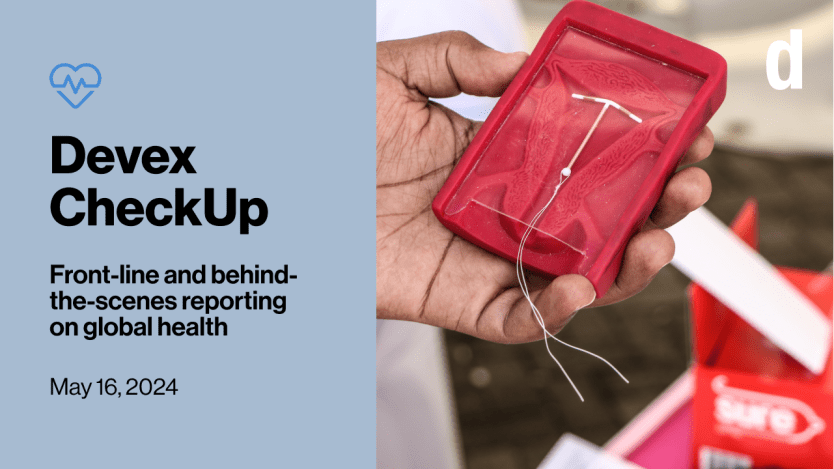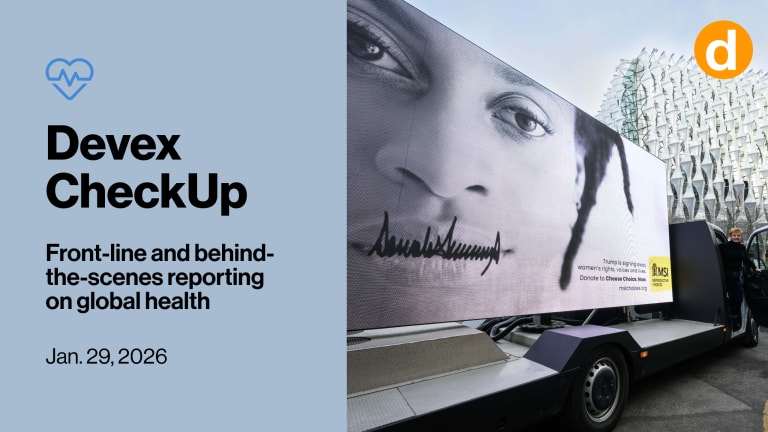
If former President Donald Trump is victorious in the upcoming U.S. presidential election, does he have an expanded version of the global gag rule waiting in the wings?
The rule, which has been supported by every Republican president since Ronald Reagan introduced it, bans U.S. aid funding to foreign NGOs for abortion-related activities. But Trump expanded its reach during his first term in office to include subgrantees of U.S. aid recipients.
This is a preview of Devex CheckUp
Sign up to this newsletter for exclusive global health news and insider insights, in your inbox every Thursday.
MSI Reproductive Choices, which provides contraception and safe abortion services around the world, estimated that 8 million women lost access to sexual and reproductive health and rights services, or SRHR, during Trump’s term, resulting in 6 million unintended pregnancies and 1.8 million unsafe abortions.
Now the concern among SRHR advocates is that if Trump wins office in November, he might expand the gag rule again to include all U.S. development assistance and block funding to multilateral organizations that work in the field, such as the United Nations Population Fund. Why do they fear that? Because it’s explicitly spelled out in a conservative policy agenda that has the backing of right-wing funders, my colleague Jenny Lei Ravelo writes.
But some organizations aren’t waiting for Trump’s potential second term. In some parts of Africa, conservative U.S.-based groups such as Family Watch International are taking steps to try and undermine or eliminate comprehensive sex education, which they say sexualizes young children. CSE can include lessons on consent, contraception, and access to SRHR services.
They are also pushing to overturn abortion legislation in some countries — such as Ethiopia — that has led to the dramatic expansion of abortion and contraception. Those movements are unlikely to be deterred even if Trump isn’t elected again, says Sarah Shaw, associate director of advocacy at MSI Reproductive Choices. “There will still be a lot of pushback, I think, on women's rights, because these organizations, they're becoming entrenched,” she says. “They're building their own ecosystems, their own architecture at country level.”
Read: The ‘frightening’ long-term impact of the global gag rule
+ May is the last month to take advantage of early access pricing for Devex World! Join us on Oct. 24 in Washington, D.C., at Studio Theater to connect with leaders shaping the future of global development.
You’ll hear from John Nkengasong, the first director of the Africa CDC and first U.S. global AIDS coordinator of African descent; Priya Basu, executive head of the Pandemic Fund; Dr. Soumya Swaminathan, former chief scientist at the World Health Organization, and more. Get your ticket by May 31 before prices increase.
French exit
Already a key player in this space, might Melinda French Gates soon be ramping up her own efforts to improve SRHR and other programs for women and girls? It could be the next act following her announcement earlier this week that she will be stepping down as co-chair of the Bill & Melinda Gates Foundation by early June.
French Gates, who has long been a champion of programs for global health and gender equality, will receive $12.5 billion in the split to continue her work on behalf of women and families. It’s unclear, though, exactly how she will use that money and whether the focus will continue to be global or will become more local.
Her own philanthropic investment company, Pivotal Ventures, has been working to advance social progress, particularly for women and minorities in the United States.
We’re also waiting to see how her departure will shift the focus of an institution that is a major player in global health — and will now be renamed the Gates Foundation.
Read: Melinda French Gates resigns from Bill & Melinda Gates Foundation
Related: Gates Foundation's top 10 gender equality grant winners (Pro)
+ Devex is officially on Telegram and WhatsApp! Join our channels to receive updates on the latest global health and other development news directly to your mobile device.
‘A bloody coup’
Members of Women in Global Health are outraged that a man was appointed to be the new board chair of the international organization.
“I didn't go through all the shit I've gone through for my entire career just to have a man put in charge of me. For God’s sake,” one woman said during an internal call on Wednesday.
They are also upset that their leader of nine years, Dr. Roopa Dhatt, was unexpectedly terminated last week, with one woman calling it a “bloody coup.”
But the organization tells my colleague Sara Jerving that the new board chair is only joining on an interim basis and that they are actively recruiting new women board members and expect to appoint a new board chair “in due course.” The organization said it has commissioned an extensive investigation into its own governance dating back to 2021.
“I’m deeply saddened and bewildered by the actions of the board in recent weeks,” Dhatt wrote to Sara. “As the founder of WGH, I believe deeply in its mission. I welcome the transparency of an independent external investigation, and I hope that the role and actions of the board are included in its remit. The work of WGH must continue — this movement is too important.”
Scoop: Women in Global Health launches investigation, man to lead board
Fresh face
“There’s also a sense … from a lot of finance ministries around the world that health had its heyday with the pandemic and now it’s time to move on to another thing.”
— Lucas de Toca, Australia’s global health ambassadorAt just 36 years old, de Toca represents Australia and the broader Pacific and Southeast Asia region to the Gavi, the Vaccine Alliance’s board, the Global Fund to Fight AIDS, Tuberculosis and Malaria, and the World Health Organization, among others. And one of his key responsibilities, as he sees it, is to figure out how to maintain momentum in global health even in an era of shrinking funds.
The key is to continue to convince donors that every dollar is going as far as possible. He points to initiatives like the Lusaka Agenda, which is supposed to make sure that the large global health initiatives are pursuing complementary agendas, but not overlapping.
At the same time, he knows that the global health funding growth of the past is probably over, so he’s looking to specifically protect the interests of the Pacific and Southeast Asia region. “If we’re not in the room,” he told my colleague Vince Chadwick in a wide-ranging interview, “often Pacific voices are not heard.”
Read: Talking pandemics and power with Australia’s global health wunderkind (Pro)
+ Not yet a Devex Pro member? Start your 15-day free trial today to access all our expert analyses, insider insights, funding data, exclusive events, and more.
What we’re reading
Ahead of national elections at the end of May, South African President Cyril Ramaphosa is about to sign a new law he believes will pave a path toward universal health care. But its opponents argue that it will destroy an already fragile system. [Bloomberg]
Drug-resistant infections already kill at least 1.2 million people per year, and climate change — particularly the spread of unclean water in floods or during displacements — threatens to increase their spread. [The Guardian]
With a final round of talks scheduled to wrap up tomorrow, both high- and low-income countries voice criticisms over the current state of the pandemic treaty. [Associated Press]








